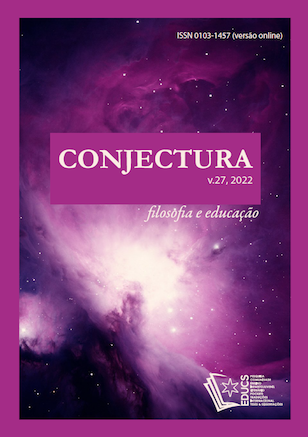From the moralist christian to the nihilist buddhist: reflections on contemporary morals based on Nietzsche’s Genealogy of Morals
DOI:
https://doi.org/10.18226/21784612.v27.e022038Abstract
This paper aims to reflect on contemporary morals from the point of view of Nietzsche’s ethics, especially its development in On the Genealogy of Morals, and, as a counterpoint to be discussed, from the book The weariness of the self by the French sociologist Alain Ehrenberg. Initially, to analyze some relevant moral types in the first work, we review the genealogical itinerary between the Christian “will to truth” and Buddhist nihilism (or “skepticism regarding moral”), highlighting some comments by Nietzsche about Kant and English utilitarianism. Kant’s self-criticism of knowledge, after all, kept the negative (Christian) valuation of life intact by not questioning the value of truth itself. English utilitarianism, in turn, by arrogating the ultimate good to happiness, made Christian compassion compatible with the “skepticism regarding moral”. From this, we argue that the new morally exemplary figure – no longer being the Christian, the main target of Nietzsche’s Genealogy – is the Buddhist, since it fully adheres to nihilism. In a second moment of this study, we problematize Ehrenberg’s thesis according to which the figure of the “sovereign individual” would have today become hegemonic under the aegis of the category of depression. Since such a depressed “sovereign individual” described by Ehrenberg is not conceivable under the Nietzschean prism, we argue, finally, that it is nihilism that effectively proliferates today. Basing itself on the illusion of the complete overcoming of morality, contemporary morals cultivate weakness and physiologically exhaustion through an unrestricted program for eliminating suffering.
Keywords: Nietzsche. On The Genealogy of Morals. Buddhist. Nihilism. Sovereign individual.
References
EHRENBERG, A. The weariness of the self: diagnosing the history of depression in the contemporary age. Quebec: McGill-Queen’s University Press, 2010.
LARSON, G. J.; BHATTACHARYA, R. Encyclopedia of Indian Philosophies. v. 4: Sam-khya Philosophy. New Delhi: Motilal Banarsidass, 2010.
MELMAN, C. O homem sem gravidade: gozar a qualquer preço. Rio de Janeiro: Compa-nhia de Freud, 2008.
NIETZSCHE, F. Aurora. Trad. Paulo César de Souza. São Paulo: Companhia das Letras, 2004.
NIETZSCHE, F. Além do bem e do mal. Trad. Paulo César de Souza. São Paulo: Compa-nhia das Letras, 2005.
NIETZSCHE, F. Crepúsculo dos ídolos. Trad. Paulo César de Souza. São Paulo: Compa-nhia das Letras, 2006.
NIETZSCHE, F. O anticristo. Trad. Paulo César de Souza. São Paulo: Companhia das Le-tras, 2007.
NIETZSCHE, F. A vontade de poder. Trad. Marcos Sinésio Pereira Fernandes e Francisco José Dias de Morais. Rio de Janeiro: Contraponto, 2008.
NIETZSCHE, F. Genealogia da moral. Trad. Paulo César de Souza. São Paulo: Companhia das Letras, 2009.
PASCHOAL, A. E. Nietzsche e o ressentimento. São Paulo: Humanistas, 2014.
VAZ, P. A vida feliz das vítimas. In: FREIRE-FILHO, J. (org.). Ser feliz hoje: reflexões sobre o imperativo da felicidade. Rio de Janeiro: FGV, 2010.
Downloads
Published
How to Cite
Issue
Section
License
1. The publication of the originals will imply the assignment of copyright to Conjectura Journal.
2. Texts cannot be reproduced without authorization from the Journal after acceptance.









